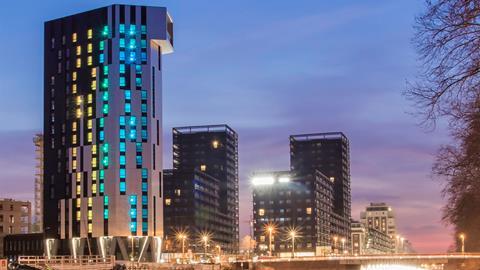A €2 bn investment programme to build 100 ‘energy-positive’ residential towers across Europe by 2030 has been launched by Berlin-based Catella Residential Investment Management (CRIM).

The towers will offer apartments at affordable rents and supply surplus power back to national grids.
CRIM will start developing the first three residential towers in Dijon, St Etienne and Montevrain in France in 2020, and plans to launch three additional schemes in the French market later next year.
Other European cities will follow in 2021. Energy-positive towers are buildings that generate more energy than tenants consume.
The project is a partnership with Dijon-based building and engineering company, Elithis.
CRIM has made an initial equity commitment for investment into three residential towers on behalf of its specialist residential funds. Thirty-six sites have been identified in France for development, with the aim of delivering a total of 50 projects in major urban centres throughout the country.
The first projects outside France will be launched in 2021 as part of a strategy to develop a further 50 energy-positive residential towers across European markets over the next decade.
Under the terms of the partnership, every new tower that is built will seek to embed ‘continuous improvement’ practices into the development process.
The towers will also be built in such a way that they can easily be converted for other functions than residential use, if necessary. Despite all the sustainable features, the construction costs are not higher than for a regular residential tower, CRIM said.
The technology employed in the buildings includes photovoltaic panels and a bioclimatic design which aims to protect the environment and natural resources.
Each tower will reward individual efforts in sustainability through smart artificial intelligence applications. Occupiers will have the ability to totally or partially eliminate their energy bills, saving around €1,600 per year. They will also benefit from lower operating costs for the tower, thanks to the least expensive technological choices in terms of maintenance.
Xavier Jongen, managing director at CRIM, said: ‘Major European cities are facing an affordability housing crisis, particularly for younger people flocking to the big urban centres for education and work, because residential supply is nowhere close to meeting the huge demand.
‘We believe that Catella’s partnership with Elithis offers a blueprint for one potential solution to this crisis, which is fragmenting the social fabric of our cities, while also addressing the other great challenge of our times in global climate change. This can only be achieved by harnessing the financial firepower of institutional investors who are now realising the great untapped investment potential of European residential markets.
‘Not only do these investments offer stable, long-term and low-risk rental income-based returns, they also allow pension funds, insurers and others to meet their increasing obligations to target investments that make a positive social and environmental impact.’
Thierry Bievre, CEO of Elithis, said: ‘For more than 10 years, we have been conceiving, designing and developing energy-positive buildings. Our energy-positive office tower delivered in Dijon in 2009 was the first of this type in the world and still outperforms industry regulatory requirements and standard certifications.
‘After achieving that milestone, we were able to enhance our conceptual model and deliver the world’s first energy-positive residential tower in 2018: the Elithis Danube Tower in Strasbourg.
‘Our landmark agreement with Catella will help us broaden our base, and further consolidate our construction expertise and ability to develop affordable residential buildings incorporating a virtuous energy and carbon emission cycle.’
Elithis is a world leader in the design and development of energy-positive buildings. Catella manages the largest cross-border residential real estate investment platform in Europe, with total assets of nearly €4 bn across nine countries.










